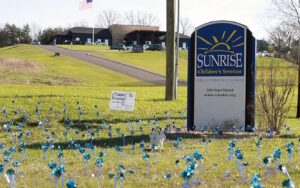
NIGER, West Africa (BP)–Ibrahim* first came into Warren and Sharon Hesslings’ life as a Tuareg language guide for Warren. Though Ibrahim was at first belligerent when the Bible was brought up, his defensiveness turned to intrigue as he studied the English Bible to learn Hessling’s language.
“One day he came to the house here and he said, ‘Today, I have to do something,’” Hessling recalls. “Several hours later he prayed the sinner’s prayer and accepted the Lord as his Savior.”
Ibrahim didn’t wait long before he was sharing the same message with his family. But they rejected his faith. The Tuareg people drink water from a common bowl, but after Ibrahim’s conversion, he was given his own bowl of water. And, in a culture where water is life, the water left in his bowl was tossed out. When Ibrahim was unemployed, his family refused to feed him.
“He’s never been beaten, but he may as well have been for what he has been put through,” Warren says.
Although Ibrahim’s own family has persecuted him for his faith, he continues to share the message of Jesus Christ. It is Ibrahim’s example that gives the Hesslings hope that the Tuareg will embrace Christ.
Ibrahim has seen drastic changes in the lives of his people -– moving from their historically nomadic life to urban living -– and the turmoil that has placed on Tuareg society. Among the changes is exposure to the Gospel. While Tuareg are traditionally Muslim, Ibrahim says they are searching for meaning during this time of transition.
He found a steady foundation in Jesus Christ at a shaky time in his own life. He made the move to Niamey, Niger, from his home village five years ago, joining other Tuareg in the hunt for something better. When he began serving as a language guide for Hessling, however, he saw the concept of homeland in new light.
Ibrahim recalls the first year he spent with Hessling as the two read the Bible together. Each lesson brought more questions for Ibrahim, which finally led him to know the Bible as truth and accept Jesus as his Savior.
“I tried to share my understanding, what I believe, with my people, to my cousins,” Ibrahim says. “They refused to agree with me.”
Soon, a family of believers developed around Ibrahim, however. He had been teaching the Koran to his friend, Amir*, but when Ibrahim went to meet his friend after his conversion, Amir said he didn’t need the lesson that day.
“I said, ‘I’m a Christian today. You’re a Muslim today, no problem. I will still teach you the Koran — change nothing,’” Ibrahim recalls. “Finally he agreed so I taught him the Koran until he moved into my house.”
One morning, Amir saw Ibrahim reading his Bible and asked what he was reading. Ibrahim read the biblical story of Jonah to Amir. That began a regular Bible study for the two, which eventually replaced the Koran study altogether. Today, Amir is also a believer in Christ and thus a brother to Ibrahim. A third housemate also has become a believer in Christ, so the three now study the Bible and encourage one another in the faith. Day-to-day challenges can easily overcome them, from family struggles to the basic need for food.
These believers are encouraged, however, that their persistence will not only keep them strong in their faith, but also lead others to Christ. They return to their home villages whenever money and time allow. Though they may face persecution, the believers share the faith that drives their lives.
Hessling notes this is the way the Gospel will be taken to Tuareg far and wide. One barrier to evangelizing the Tuareg is the vast distances that exist between them, yet a bridge exists in their nomadic lifestyle to open lines of communication between villages. Ibrahim alone has traveled to Chad, Libya, Nigeria, Burkina Faso, Mali and parts of the Mediterranean.
With the openness among Tuareg today, Ibrahim longs for more helpers to come and help share the message. American missionaries, he says, are especially needed now because Tuareg have no problems with Americans. Additionally, there aren’t enough Tuareg believers to take the message to all his people.
“Our work has become vast now,” Ibrahim says of the Gospel. “Our work has become heavy for us. I hope one day God will provide helpers.”
–30–
*Names changed for security reasons.














